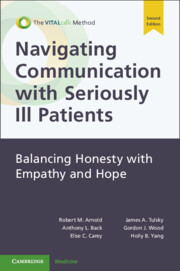Book contents
- Navigating Communication with Seriously Ill Patients
- Navigating Communication with Seriously Ill Patients
- Copyright page
- Dedication
- Reviews
- Contents
- Preface
- Acknowledgments
- 1 Taking Your Skills to the Next Level
- 2 Foundational Communication Skills
- 3 Talking about Serious News
- 4 Discussing Prognosis
- 5 Planning for the Future: Discussing What’s Important, Well Before a Crisis
- 6 Discussing Treatment Decisions
- 7 Between the Big Events
- 8 Goals of Care in Late-Stage Disease
- 9 Conducting a Family Conference
- 10 Dealing with Conflicts between Clinicians and Patients
- 11 Working Through Conflicts with Colleagues
- 12 When You’re Really Stuck
- 13 Talking about Dying
- 14 Cultivating Your Skills
- Index
- References
8 - Goals of Care in Late-Stage Disease
Uncovering the Big Picture Amidst Fear and Failure
Published online by Cambridge University Press: 05 April 2024
- Navigating Communication with Seriously Ill Patients
- Navigating Communication with Seriously Ill Patients
- Copyright page
- Dedication
- Reviews
- Contents
- Preface
- Acknowledgments
- 1 Taking Your Skills to the Next Level
- 2 Foundational Communication Skills
- 3 Talking about Serious News
- 4 Discussing Prognosis
- 5 Planning for the Future: Discussing What’s Important, Well Before a Crisis
- 6 Discussing Treatment Decisions
- 7 Between the Big Events
- 8 Goals of Care in Late-Stage Disease
- 9 Conducting a Family Conference
- 10 Dealing with Conflicts between Clinicians and Patients
- 11 Working Through Conflicts with Colleagues
- 12 When You’re Really Stuck
- 13 Talking about Dying
- 14 Cultivating Your Skills
- Index
- References
Summary
When prolonging life with acceptable quality of life becomes difficult, goals of care discussion are necessary. For clinicians and patients, the discontinuation of disease-modifying therapy can feel like a failure. This can lead clinicians to offer treatments we don’t believe are good options or offering treatment on the condition that our patients make an improbable recovery. The roadmap for late stage goals of care discussions is REMAP. Reframe why the status quo isn’t working, expect emotion and respond with empathy, map big picture values, align with the patient’s values, and finally plan medical treatments based on what’s important to your patient. Some things to note: Mapping thoroughly will help you make sure you don’t miss something important. A useful shift in thinking for many clinicians is first talking about what you will do before talking about what should be stopped or you won’t offer. And, clearly linking your recommendations to the patient’s values will help your proposed plan be more acceptable. By grounding ourselves in what is medically possible and using the patient’s values to guide our next steps, we can cocreate a plan that is both possible and meaningful.
- Type
- Chapter
- Information
- Navigating Communication with Seriously Ill PatientsBalancing Honesty with Empathy and Hope, pp. 116 - 135Publisher: Cambridge University PressPrint publication year: 2024



